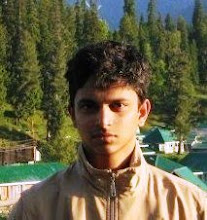Nigel Britto
Ever since the sign of the horns, also called the cornuto, was popularised in the late 1960s by Anton LaVey, the late high priest of Satan, maniacal fans of metal music have vigorously punched the air with it. Add to that the metal bands' morbid-sounding names, untamed hair, outlandish black attire and blood-curdling growls… No wonder metal is considered to be straight out of the flames of hell - or headed there.
Sound Check:
Take Blood Covenant, a Chennai-based band. Fits the description perfectly. Morbid sounding name - check. Wild, unruly hair - check. Black attire - check. Blood-curdling growls - of course, check. And they play black metal, the most violent form of music there is. The screaming lead vocalist Eddie sounds like an enraged bull. Drummer Brijesh pummels the kit with a ferocious double bass played at the speed of light. Blood Covenant groupies always form a mosh pit at gigs. Into this arena of frenzy, the metalheads jump, headbang, thrash about, crowd-surf , body-slam . Would Satan be proud of them? Keep guessing...
Move over to Mumbai. You find Met Basar and New Hope Order. To Bangalore, WhitenoiZ and Crucifix Guide. To Mizoram, Magdalene. To Goa, Celestial Portal. To the normal, reasonable person, these bands would look and sound like the American death metal bands Slayer or Deicide.
Until you analyse their lyrics. Hellish images fly out the window when you hear Celestial Portal screaming about "breaking free" and "choosing the light" . Blood Covenant looks like it walked right out of LaVey's The Satanic Bible but actually growls about the New Testament. WhitenoiZ is a radio frequency sans barriers, and 'noiZ' spelt backwards reads 'Zion' - the Promised Land. It's quite clear. On the quiet, Christianity and metal have happily married. Hell's bells!
The First Riffs:
It started out with Stryper. In the seventies, this California-based glam metal outfit became the first faith-based band to break into the mainstream. Famous for throwing Bibles into the audience, the band led the way for a movement which is sometimes called 'heaven metal' . To Hell With The Devil was the very popular, platinum-selling , Grammynominated album of this band that took its name from the Biblical phrase "with his stripes we are healed" .
Now, 25 years later, bands like As I Lay Dying (metalcore, US) and Mortification (death metal, Australia) - whose members describe themselves as Christian - are pretty much at home on the mainstream circuit. Mark Abraham of WhitenoiZ says, "Rex Carroll or Chris Impelliteri are as brilliant as Van Halen or Yngwie Malmsteen, but lesser known because of their genre." Carroll is guitarist for the Chicago-based Christian metal band Whitecross. And heavy-metal guitarist Impelliteri was rated by Guitar One magazine (2003) as the second-fastest shredder ever, ahead of Mr Big's Paul Gilbert and Swedish neo-classical metal pioneer Malmsteen.
The evolution of any faith-based movement is often impeded by doubting Thomases, and Christian metal musicians find themselves in a peculiar dilemma. Christians don't think they're Christian enough and non-Christians don't believe they're Christians at all! But these metalheads beg to differ . Says Jeshurun D'Cruz , drummer/vocalist for Celestial Portal, "Like a knife, music by itself is neutral - not good, not bad. It is the purpose for which you use music that is important." The purpose behind their music is evangelism, he says. And they use metal to reach out to a certain audience . Brijesh elaborates, "You don't go to Chennai and preach in Marathi. That just won't work. You have to witness to people in a language that they understand." And if the only language you understand is metal, then metal it has to be.
Another counterview that is often thrown at them: Metal is a 'violent' , 'weird' form of music, not to be indulged in by self-proclaimed Christians . Here too, the metalheads' defence is ready. D'Cruz jumps in: "God is much bigger than mere church music." It's a misconception that Christian music has to be limited to the walls of a church. Abraham adds: "Music is a gift of God. He decided that three or more pitches played simultaneously form a chord. Whether you play it on an acoustic guitar or on a mean-looking electric with distortion , it remains a chord!"
Vedic Metal:
Christians aren't alone on the metal route. Rudra, a Singaporean band, has an Om in its logo and applies the Vedas to death metal instrumentation. Its muse: The ancient Hindu philosophy of Advaita Vedanta, which teaches that the self (atman) is identical with the cosmic spirit (Brahman). Through their albums Kurukshetra and Brahma Vidya: Premordial, they have pioneered a new genre, which they call 'Vedic metal' because "that is the philosophy that flows through our lyrics" .
Does faith-based music help in evangelism? Yes, says Naresh Nathan from Bangalore. He played for Chaotica, a heavy-metal band that screeched about a "reign of chaos" , but when his pals bombarded him with Christian rock, he became a practicing Christian and formed a new band, Slain, which sings of the "power of Christ" .
It may be loud. It may be crazy. But heaven metal gets its validation from the spinal cord of Christianity, The Holy Bible. Psalm 150 urges Christians to "praise Him with harp and lyre" and with a "clash of cymbals" . The Old Testament exhorts them to "make a loud noise unto the Lord" (Psalm 98:4). The harps are now electric guitars and the clash of cymbals the thrash-smash-flash of monster drum kits... The noise may have gotten louder but the soul still whispers through.
This article was first published in The Times of India's Crest edition dated October 10, 2009.


